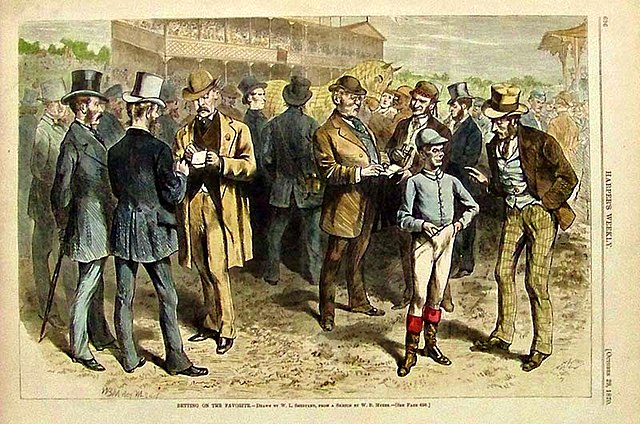Sports betting has long been a staple of British culture, evolving from casual wagers to a sophisticated industry that captivates millions. With technological advancements, the sports betting landscape has undergone significant changes, providing punters with a vast array of options and unprecedented access to historical sports betting data. This article explores the rich history of sports betting, highlighting key milestones and the impact of technology.
From Horse Racing to Betting Shops
Sports betting in the UK dates back to the 18th century when horse racing became a favourite pastime among the British aristocracy. Betting on horse races quickly gained popularity, leading to the establishment of the first formal betting shops. These early shops were often situated near racecourses, making it convenient for punters to place their bets.

|
As horse racing's popularity soared, the demand for organised betting systems grew. This led to the formation of the Jockey Club in 1750, which regulated horse racing and ensured fair play. The Jockey Club's efforts to maintain the sport's integrity laid the groundwork for modern sports betting practices.
Football Betting Takes Centre Stage
While horse racing dominated the betting scene, the late 19th and early 20th centuries saw football emerge as a major betting market. The establishment of the Football League in 1888 provided a structured framework for football competitions, making it easier for bookmakers to offer odds on matches.
Football betting gained further traction with the introduction of football pools in the 1920s. These pools allowed punters to predict the outcomes of multiple matches, offering substantial prizes for correct predictions. This innovation made football betting more accessible to the general public and solidified its place in British culture.
Technology's Role in Transforming Sports Betting
The internet's arrival in the late 20th century revolutionised the sports betting industry. Online betting platforms emerged, allowing punters to place bets from the comfort of their homes. This shift not only expanded the reach of sports betting but also introduced new markets and options.

|
One of the most significant advancements has been the availability of historical sports betting data. Websites like Coral provide comprehensive data on past events, enabling punters to make informed decisions based on trends and statistics. This wealth of information has transformed sports betting from a game of chance to a more strategic endeavour.
Ensuring Fair Play and Responsible Gambling
As the sports betting industry has grown, so has the need for regulation to protect consumers and ensure fair play. The UK Gambling Commission, established in 2007, oversees all forms of gambling in the country, including sports betting. The commission's efforts to promote responsible gambling have been crucial in maintaining the industry's integrity.
In recent years, there has been a growing emphasis on responsible gambling, with operators required to implement measures to prevent problem gambling. Initiatives such as self-exclusion programmes and deposit limits are designed to help punters gamble responsibly and avoid the pitfalls of addiction.
What Lies Ahead for Sports Betting?
The sports betting industry continues to evolve, with new technologies and innovations shaping its future. The rise of mobile betting apps has made it easier than ever for punters to place bets on the go, while advancements in artificial intelligence and machine learning are set to revolutionise the way odds are calculated and bets are placed.

|
Additionally, the increasing popularity of esports has opened up new avenues for sports betting. As competitive gaming continues to grow, so does the potential for betting on esports events. This emerging market presents exciting opportunities for both bookmakers and punters alike.
For more insights into the latest developments in sports betting, check out the coverage provided by The Guardian and BBC Sport, which offer up-to-date news and analysis on the industry.
Looking forward, it's clear that sports betting will remain a dynamic and evolving industry, offering endless possibilities for those who enjoy the thrill of the wager.







